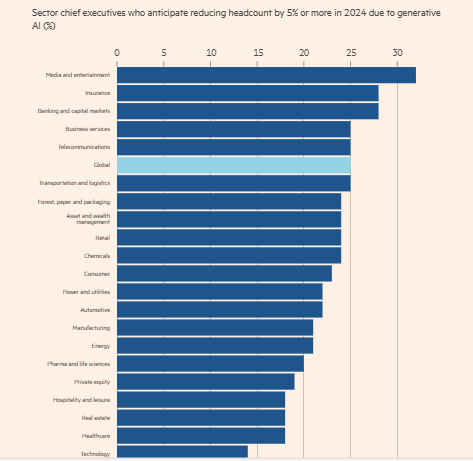the health strategist
institute, portal & consulting
for workforce health & economic prosperity
Joaquim Cardoso MSc.
Servant Leader, Chief Research & Strategy Officer (CRSO),
Editor in Chief and Senior Advisor
January 21, 2024
This is an Executive Summary of the article “Generative artificial intelligence will lead to job cuts this year, CEOs say”, published by the Financial Times, and authored by Sam Fleming
Central Message:
Generative artificial intelligence is anticipated to result in job cuts, with a quarter of global CEOs foreseeing a minimum 5% reduction in headcount this year.
This revelation, unveiled in a PwC survey at the World Economic Forum in Davos, reflects the transformative impact of AI on industries, particularly media, entertainment, banking, insurance, and logistics.
The study also underscores the varied expectations regarding generative AI’s profitability enhancement, with concerns about job losses contrasting with the anticipation of increased profitability.
Executive Summary:
As world and business leaders convene at the World Economic Forum in Davos, a PwC survey reveals that 25% of global CEOs expect generative artificial intelligence to lead to job cuts of at least 5% in 2024.
Sectors such as media, entertainment, banking, insurance, and logistics are particularly wary of the potential workforce reductions due to cutting-edge AI tools.
On the flip side, engineering, construction, and technology firms are more optimistic about avoiding job cuts.
The survey, based on interviews with 4,702 CEOs across 105 countries, also highlights the divergence in expectations regarding the impact of generative AI on profitability, with 46% foreseeing a boost, while 47% expect little to no change.

Examples and Statistics:
- Job Cut Expectations: A quarter of CEOs globally anticipate job cuts of at least 5% due to generative AI.
- Industry Variances: Media, entertainment, banking, insurance, and logistics sectors are most likely to predict job losses.
- Profitability Outlook: 46% of CEOs expect generative AI to boost profitability, while 47% anticipate little or no change.
- Global Adoption: 32% of executives have adopted generative AI across their companies in the past year.
- Product and Service Quality: 58% believe generative AI will enhance the quality of their products or services.
- Skill Development: 69% think their employees will need to acquire new skills due to the adoption of generative AI.
Conclusions:
The survey’s findings underscore the dual nature of expectations surrounding generative AI, revealing a significant divide among CEOs regarding its impact on employment and profitability.
While a considerable number anticipate job cuts, others see the potential for enhanced product quality and profitability.
This divergence emphasizes the need for strategic planning and adaptive measures to navigate the transformative landscape of AI.
Business leaders are urged to address the disruptive forces within their industries, including generative AI and climate change, as part of a broader transformational agenda.
Recommendations:
- Strategic Workforce Planning: Companies should proactively engage in strategic workforce planning to mitigate potential job cuts and align their workforce with evolving technological landscapes.
- Investment in Skill Development: Given the expectation that employees will need new skills, organizations should invest in training and upskilling programs to prepare their workforce for the demands of generative AI and emerging technologies.
- Ethical AI Deployment: As generative AI adoption increases, companies must prioritize ethical considerations and responsible AI deployment to address societal concerns and potential regulatory scrutiny.
- Cybersecurity Preparedness: Recognizing executives’ concerns about cybersecurity, organizations should bolster their cybersecurity measures to protect against potential AI-related threats.
- Collaboration and Knowledge Exchange: Business leaders should actively engage in forums like the World Economic Forum to foster collaboration, share insights, and collectively address challenges arising from AI, cybersecurity, and other disruptive forces.












